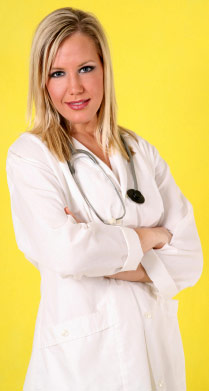Women in Medicine Part 9
Can women "have it all?" That is, can they be good mothers, wives, daughters, friends, neighbors, and still be good doctors?
Are women as competent as men?
Are women achieving their potential?
What can women do to achieve more?

Q: I want to be an ER doctor but I really hate getting shots. My mom told me that in medical school you have to give shots to yourself and to other students in your medical class. Is that true?
Jessica
Answer by Kevin Pezzi, MD: In this message, I will point out that getting a shot should be the least of your worries. Are you ready? Better take a deep breath!
When I was young I was equally terrified of getting shots, so I can sympathize with your concern. The good news is that in medical school you do not have to be on the receiving end of a needle. You cannot graduate from medical school without performing a number of procedures (and giving an injection is certainly the most elementary procedure I can think of), but you don't need to be the guinea pig. In medical school we practiced drawing blood on one another before we treated patients, but if having your blood drawn is something you cannot handle, just explain to your teacher and fellow students that you're terrified of needles. People in medicine are usually very nice and accommodating, so no one will force you into doing something you do not want to do.
By the way, if it is just the needle pain that bothers you, that can be diminished by prior application of everything from an ice cube to a local anesthetic cream (e.g., Emla®). In Fascinating Health Secrets, I discussed other ways of mitigating pain, both acutely and chronically. The pain threshold is easily modifiable.

Like to sleep?
Think twice about medical school!
Unfortunately, the other noxious aspects of becoming a doctor are not so easy to eradicate. For example, the chronic sleep deprivation faced by doctors-in-training is literally torture. If the criminal justice system tried meting out that punishment to convicted mass murderers, the US Supreme Court would order that practice terminated on the grounds it was cruel and unusual punishment—something outlawed by the Constitution. However, in this regard the Constitution only protects people from torture if they are not asking for it—and by applying to medical school, you are not only asking for it, you're paying dearly for it. Going without adequate sleep for one night is bad enough, but going without adequate sleep for years in a row is one of the most horrendous experiences one can endure.
So why would anyone subject themselves to such a noxious experience? Most physicians possess a somewhat masochistic streak; they soak up punishment, and keep on smiling. I think most prospective doctors, deep down, have a poor self-image and they will subject themselves to untold horrors just to experience the positive reward of getting an MD.

Like spending time with your friends?
Think twice about medical school!
Beyond the sleep deprivation, other things will surely make you think twice about your decision to apply to medical school. For example, unless you are content being a second-rate doctor you may as well kiss your parents, siblings, friends, and boyfriend goodbye for a decade or more because you'll rarely see them. If you find the time for normal socialization you are either a heck of a lot smarter than me (and I graduated in the top 1% of my medical school class), or you're not as dedicated to studying medicine as you should be. When you become a doctor, you hold other people's lives in your hands, so if you are not willing to sacrifice your life to become the best possible doctor then you should step aside and let a more dedicated person take your place.
Imagine that you are a patient in an emergency room and the ER doc is fighting to save your life. Would you prefer that this doctor be a laid-back nice guy who took the time to attend the weddings of his friends, go to his class and family reunions, hang out with his buddies, and visit his family on a regular basis? I doubt it. Rather than assuaging his personal desires, you'd likely wish that your doc had his nose glued to textbooks and journals learning facts that might make the difference between life and death. Your life.
This discussion isn't merely academic. I worked with both types of ER doctors—let's call them Type A and Type B—and I know that the laid-back Type B docs send a lot more people to an early grave. To put it succinctly, excellence (or lack thereof) in medicine is palpable, and the consequences are weighty.
This stratification of ability applies to other specialties, too. For example, I know an ICU doc who stunned me with his ability to figure out what toxin induced illness in patients who would present to the ER every so often with mysterious diseases. I am not taking about carbon monoxide or cyanide or acetaminophen or things that any critical care doc could diagnose, I'm talking about some truly weird stuff that left me wondering, “How on Earth did he know enough to even suspect that was the culprit?” Given that there are a zillion potentially toxic chemicals, physicians cannot test for all of them. This doc knew enough to ferret out the responsible agent. If he saved your life, or the life of someone you love, you would not care that his personality was so drab that he made me seem like an ebullient game show host; you would be thrilled that he sacrificed his personal life so he could become a better, more knowledgeable doctor.
Although you did not address the question of whether it is possible to combine motherhood with a medical career, I will. Right off the bat I'll state that it is impossible to be a first-rate mother and a topnotch doctor. If you want to do both, someone will suffer: either your patients, or your children (unless you somehow invent a way to stretch the allotted 24 hours in a day). Anyone who thinks otherwise is either delusional or fails to appreciate the time it takes to be a great mother or doctor. Before you continue, if you haven't already done so, read my review of Walking Out On The Boys by neurosurgeon Frances K. Conley, MD.
Why am I telling you all this? Getting a shot in medical school should be the least of your worries. Instead, what you should focus on is the fact that medicine is a career that will soak up all of your time and energy. Beyond the bare minimum you need for R&R (and until you've survived internship, you have no idea of just how much that can be pared down), any other time you spend away from medicine will detract from your potential for medical excellence. Consequently, it is a tough choice: the quality of your life, or the quality of the lives of your patients. Some of the truly dedicated “eat, sleep, and breathe medicine” doctors I know are incensed about the recent influx of what they term “half-ass” doctors for whom medicine isn't an all-encompassing lifestyle.
Want more fun and less work?
Want smiles, not stress?
Read Dr. Pezzi's free e-book
Microhome Living

I'll never forget the first ER patient who died under my care when I became an attending ER doctor—not just a resident, during which time someone else shouldered the burden of ultimate responsibility. I was utterly devastated, and for the following two weeks I literally felt as if I'd been punched in the gut. I told my boss about the case, thinking that he would lambaste me. Instead, he just chuckled and said that as an ER doc it's not rare to fail to save a patient's life. He didn't see anything wrong with my care since I'd coded the patient according to the standard ACLS (Advanced Cardiac Life Support) algorithms. However, that case devastated me because I suspected that if I had been a bit better doctor I could have saved that patient's life. Indeed, after years of working in the ER, I acquired enough savvy so that saving that man's life would have been a no-brainer. What is the difference between being an average doctor and a doctor who has learned a number of lifesaving tips? Well, the answer is obvious: in this case, the difference was literally life and death.
I suppose we live in a world in which it's tough to get away from the fact that rookies will never be as good as old pros, and any patient who puts his life in the hands of a rookie doctor should know that his death may just be chalked up to one of the lessons learned on the way to becoming a better doctor. If you are a rookie doctor, you should realize that any time you spend pursuing a normal life will simply delay your mastery of your specialty. If you are a party animal, let's pray that you become a dermatologist and not an ER doctor or surgeon.
Here is my ultimate message: if you are smart and you truly care about people, then you should be a doctor. However, bear in mind that if you really care about people you will put their interests ahead of yours, and for that you will personally pay a very high price. On the other hand, few careers are as potentially rewarding as medicine. However, those rewards will accrue to you only if you find reward in helping others. The joy of medicine is the joy of helping others; if you cannot relish that joy, then you are better off in another career.
Back to the main Question & Answer page
